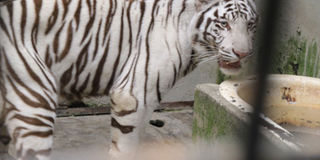Prime
UWEC imports tigers

One of the Bengal tigers that Uganda Wildlife Conservation Education Centre has added to the cat family. Photo/Paul Adude
The Uganda Wildlife Conservation Education Centre (UWEC) has imported tigers to bolster the cat family after decades to boost local and international tourism.
“We are glad to welcome the tigers to UWEC after six decades. The Bengal tigers, sometimes called Indian tigers, is a species that resonates with the Indian community, which has over the months proven to be loyal to the animals at UWEC,” the UWEC Executive Director, Mr James Musinguzi, said yesterday as he unveiled the pair of tigers at the centre.
The male and female tigers aged two and three months were flown into the country from South Africa early this year.
“The two tigers arrived on March 7 before the national lockdown and have since been under the watchful eye of our animal caregivers and veterinary specialists at the quarantine and veterinary hospital,” he said.
Mr Musinguzi said there is need to protect tigers, which are classified as endangered species according to the International Union for Conservation of Nature’s Red list of Threatened Species.
“Over the last century, subspecies of tigers dwindled from eight to five due to hunting as trophies and habitat loss from intensive logging and development. The remaining subspecies including the one we have here need protection,” he said.
Mr Musinguzi said the Covid-19 pandemic has affected UWEC’s daily operations with the centre losing Shs2.5b since its closure from March to June. He said UWEC has lost Shs2 billion since July.
“The pair’s debut deemed to be a dawn of hope fulfills our conventional roles of education, conservation, research and recreation during the Covid-19 pandemic. The pair’s move to Uganda was recommended by the Pan-African Association of Zoos and Aquaria and World Association of Zoos and Aquariums, which demands that the large cats are managed in an Ex-situ environment,” he said.
He said the previous tigers at UWEC have died of old age.
“We got the new ones for free through an exchange programme with Mystic Monkeys and Feathers Wildlife Park South Africa who we gave 25 monkeys in exchange for the two tigers,” Mr Musinguzi said.
The manager of education and information at UWEC, Mr David Musingo, said the centre will soon bring more animal species including kangaroos as part of the plan to set up regional zoos across the country.
“We are moving across the country, working with different partners, we are going to set up satellite conservation centres valued at Shs1b,” he said.
The Director for Animal and Horticulture, Ms Rachel Mbabazi, said Africa’s temperature is favourable for the tigers where suitable habitant has been constructed for them.
“The tigers have adjusted well since their arrival. Bengal tiger habitats are tropical rainforests, marshes, and tall grasses,” she said.


